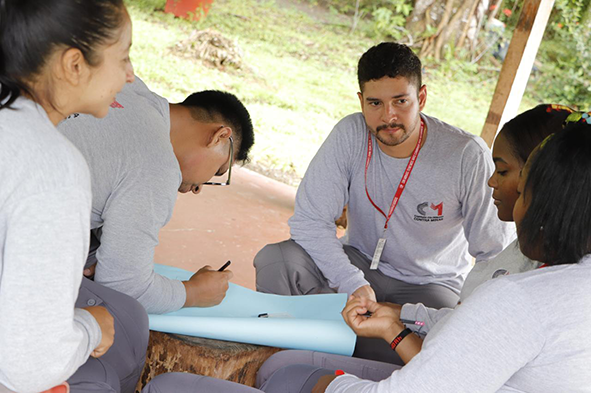How Are ICBL Campaigners Preparing for The Siem Reap - Angkor Summit on A Mine-Free World?
For more than 19 years, Alex Munyambabazi has carried two things with him: the physical reminders of surviving a landmine explosion in Uganda, and an unwavering commitment to ensure no one else faces the same fate. This November, he'll be joining government officials and landmine survivors and campaigners in Siem Reap, Cambodia, where participants hope to renew momentum toward a world free of landmines.
From 25 till 29 November 2024, Siem Reap, Cambodia will host "The Siem Reap - Angkor Summit on A Mine-Free World" - the Fifth Review Conference of the Mine Ban Treaty. The timing and the location couldn’t be more significant. The conference follows the 25th anniversary of the treaty's entry into force, and Cambodia, once among the world's most heavily mined countries, has made remarkable progress in clearing its land and becoming a leading voice in the global mine-ban movement. The host country’s experience offers both inspiration and practical lessons for nations still grappling with landmine contamination.
A Quarter Century of Progress
Since the treaty's entry into force on March 1, 1999, the international community has made remarkable strides in the fight against antipersonnel landmines. 164 nations have joined the treaty, and over 30 countries have cleared their contamination and are now mine-free. Production of landmines has been severely limited, and transfer is virtually non-existent. Perhaps most importantly, casualty rates have dropped dramatically in many affected countries, with thousands of lives and limbs spared.
"These achievements show what's possible when the world unites behind a humanitarian cause," says Tamar Gabelnick, Director of the International Campaign to Ban Landmines (ICBL). "But our work is far from complete."
Despite progress, landmines still claim lives of innocent civilians in 55 countries. Our research shows that challenges persist, including extensive use of antipersonnel mines by both governments and non-state armed groups, consistently high annual casualty numbers, and prolonged delays in land clearance not to mention the fact that 33 states still remain outside the treaty.
A Global Voice for Change
The ICBL is bringing to Siem Reap over 160 participants, including survivors and campaigners from regions affected by landmines including Asia and the Pacific, East and South Europe, Africa, South America, and the Middle East and North Africa. They will gather under this year’s slogan "Eradicate Landmines, Empower Lives: No excuses, no exceptions, no delays!”, which echoes the 1997 treaty negotiations' motto "No Exceptions, No Reservations, No Loopholes," reflecting the campaign's unwavering commitment to a comprehensive ban.
"Every region brings its own urgent challenges to the conference," explains Gabelnick. The Middle East and North Africa is in great need of more countries joining the treaty and formally adhering to the ban, while Africa faces pressing land clearance and survivor support challenges. Asia still has many countries outside the treaty, including Laos, Nepal, and Vietnam, to name a few, while many others struggle with clearing their contamination and assist victims, which is also the main priority for South America. European and North American nations are expected to ensure the needed funding and to overall help uphold the treaty’s norms.
Voices from the Campaign
The diversity of ICBL's delegation is reflected in the stories of its campaigners. Wrood, a 27-year-old advocate from Iraq, represents a new generation of advocates in the Middle East region. A victim of a landmine explosion, she now leads awareness raising campaigns to spread the knowledge in her country about the importance of the Mine Ban Treaty and the rights of survivors. "My personal experience drives me to ensure no one else experiences what happened to me" she says. "For the younger generation in our region, this isn't just about policy – it's about protecting our people, communities and ensuring survivors know their rights."

From Azerbaijan, Roza Safikhanli, joined her father Hafiz Safikhanov, a longtime ICBL campaigner, who since 1998, has been working tirelessly on the field, completing hundreds of projects to promote the vision of a landmine-free Azerbaijan and South Caucasus. Roza and Hafiz’s work do not only emphasize the importance of a mine-free region but also strive to alleviate the suffering of landmine victims. "My father's work, and now my own involvement, is a proof that clearing landmines and supporting survivors is a legacy that is passed from one generation to the next," she explains. "Our case in Azerbaijan is a perfect example showing that achieving a mine-free world requires sustained commitments across generations."

From Colombia, Miguel Reina Padilla leads the Communications team at the Colombian Campaign to Ban Landmines (CCBL), where he develops awareness campaigns about humanitarian demining and supports landmine survivors across the country. His work combines raising awareness about the Mine Ban Treaty with practical initiatives to help affected communities understand and defend their rights. "Our work in Colombia is not just focused on clearing mines from the ground – it's equally aimed at helping our communities rebuild their lives," he says. "Every campaign we launch contributes to making our communities' land safe while helping them recover from conflict and build a better, more peaceful future."

ICBL Key Expectations for the 5th Review Conference
The ICBL has outlined four crucial expectations for the conference and as such the campaign calls for:
- Announcements of achievements by States Parties and plans of States not party to join the treaty
- Unequivocal condemnation of ALL antipersonnel mine use by anyone, under any circumstances
- Genuine recommitment to ending casualties and suffering and ensuring resources for the next five years, and until the job is done
- High-level participation and meaningful inclusion of survivors, people with disabilities, and women on delegations
"This conference represents a crucial moment to turn commitment into action," says Alex, reflecting on his seven years of advocacy. "Every delay means more lives at risk. We need concrete steps and action, not just promises."

As ICBL campaigners prepare to come together in Cambodia in November, they hope their message will resonate beyond the 5th Review Conference meeting rooms: the time to eradicate landmines and empower the lives of those affected is now. No more excuses, exceptions, or delays.
